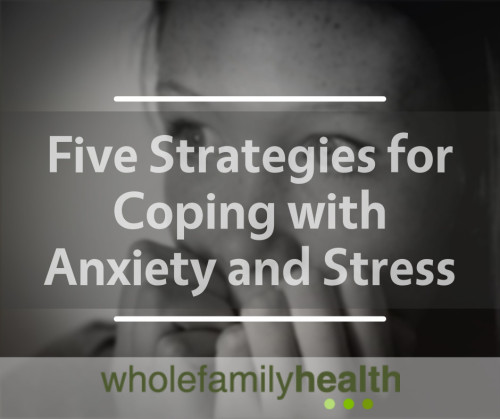Anxiety Risking our Health and Happiness Part 3: Five Strategies for Coping with Anxiety and Stress
Posted by Christina Pistotnik

I know it may seem hard to believe but I am not always the most calm and collected individual, anxiety can hit me like a ton of bricks and trust me it can be hard to come out of. Here are some strategies that I’ve learned to help me cope:
- Regular Exercise
This helps me to expel that extra pent up energy that can often turn into anxious type feelings. I’m not saying that you have to run five miles a day, but scheduling at least 30-60 min three times a week of moderate to intermediate physical activity will quell over whelming feelings of anxiety and stress. Plus getting the blood pumping and body moving enhances the release of endorphins which helps us feel happy. Exercise also, benefits self-esteem by seeing physical results that may include less body fat, increased stamina, and muscle tone. - Proper Eating Habits
I know that if I let myself get too hungry I am not a happy camper (some people call it hangry) Therefore, it is important to be eating regular meals everyday in order to stabilize blood sugar. When blood sugar becomes too low it causes stress to the brain and can lead to anxiety becoming worse. This is because the body is not getting nutrients into the blood stream.The types of food that you put into your body also have an effect on anxiety. Feel good meals should include:
-Foods high in Tryptophan (precursor to serotonin): Turkey, chicken, banana, oats, cheese, soy, nuts, and sesame seeds.
– Vitamin B rich foods/supplements: Beef, chicken, pork, eggs, leafy greens, legumes, rice, oranges/citrus fruits, nuts, and whole grains
-Omega 3 rich foods/supplements: Chia seeds, flax seeds/oil, salmon, tuna, lake trout, mackerel, sardines, and anchovies
– Foods high in Protein (stimulates production of norepinephrine and dopamine): Greek yogurt, lentils, beans, soy, nuts, cheese, eggs, and meatFoods that should be avoided that increase anxiety include:
-Caffeinated and alcoholic drinks: both lead to dehydration, which increases chances of anxiety. Caffeine also suppresses brain serotonin and as we know this is a feel good hormone.
-Foods high in sugar: The initial reaction to sugar may feel good at first but as the body releases insulin to counter balance that rush the body and mind are left feeling tired and in a low mood.
-Processed foods (meats, high fat dairy, fried foods) A UK study found that people who consumed processed foods regularly were more prone to anxiety and depression (source). - Breathing Exercises
Sometimes I let my day get away from me and realize that I have not been taking full breaths and wonder why all of a sudden I’m feeling overwhelmed? Therefore I’ve been trying to make a conscious effort to take a few deep breaths every 30 min to help my mind and body feel more at ease. Deep breathing gets more oxygen into our body that stimulates our calm at rest state of being also known as the Parasympathetic nervous system. Shallow breaths stimulate our fight or flight response or our sympathetic nervous system thus making us feel anxious and overwhelmed.
One particularly easy breathing technique I like and can be done anywhere at anytime is called “Equal Breathing” Start by inhaling through your nose and count to four and be conscious that you are moving the air all the way down (your abdomen should inflate if you are doing it right) and then exhale through your nose for a count of four. I like to do this 2-3 times in a row to really get myself in a calmer state. - Me Time
Schedule at least thirty minutes to an hour to your own downtime every week is also important when managing anxiety and stress. Relishing in the things you like to do will help you to feel happy and grounded. These things can be as simple as taking a bath, reading a book, or listening to your favourite music. Invest time in yourself, because you are worth it! - Acupuncture
As stated in my previous blogs regarding anxiety, acupuncture helps to reduce stress hormones in the body. This is essential for the body to get to its state of rest and relaxation by inducing the parasympathetic nervous system to go into action. Another added bonus to acupuncture is that it can be counted as me time! How often do we get to just lay back and relax for 45 minutes without the world buzzing around us? When coming in for anxiety treatments, I suggest starting off with weekly appointments to monitor how you are coping and if things are going well then we taper the treatments off to twice a month then to once a month.
If you have any questions about how acupuncture and Chinese medicine can help your stress and anxiety, please do not hesitate to contact us today!
